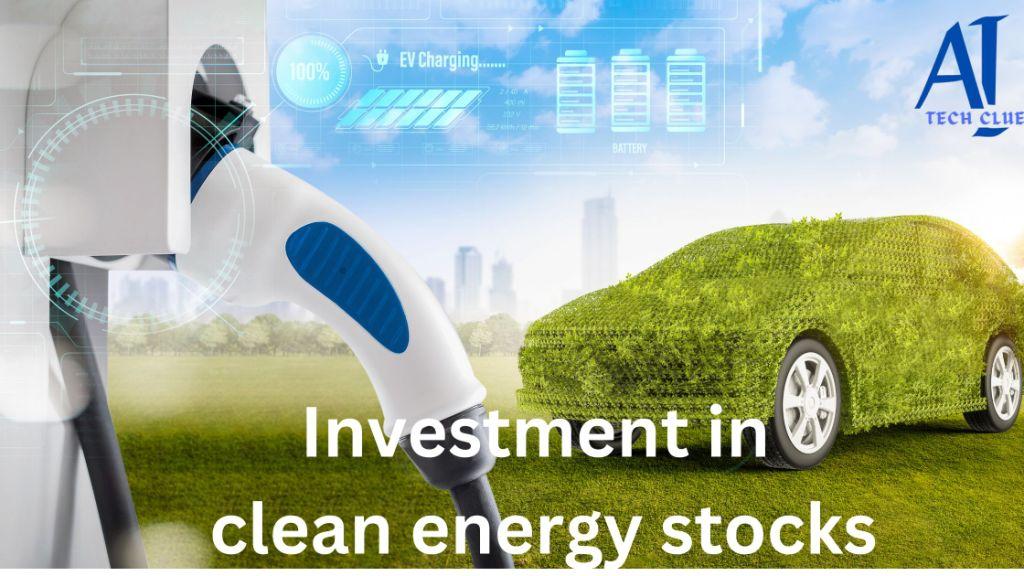Introduction
The global push towards sustainable energy and reducing carbon emissions has made electric vehicles (EVs) and clean energy stocks a hot topic for investors. The transition away from fossil fuels to renewable energy sources like solar, wind, and electric-powered transportation is reshaping the energy and automotive industries. If you’re interested in supporting green initiatives while potentially earning attractive returns, investing in these sectors might be an excellent opportunity. But how can you get started? This guide will walk you through how to invest in electric vehicles and clean energy stocks, the key players in the market, and the risks to consider.
If you want to read same article in hindi click here
Why Invest in Electric Vehicles and Clean Energy?
Electric vehicles and clean energy are at the forefront of the global shift toward sustainability. Governments worldwide are implementing stricter emissions regulations and providing incentives for companies and consumers to adopt green technologies. This creates significant growth potential for companies involved in these sectors, making them appealing investment opportunities.
Key Factors Driving Growth in EVs and Clean Energy
- Government Regulations: Policies aimed at reducing carbon footprints encourage the adoption of EVs and renewable energy.
- Consumer Demand: More people are becoming environmentally conscious, leading to increased demand for sustainable products.
- Technological Advancements: Breakthroughs in battery technology, solar power, and wind energy are making clean energy more cost-effective and accessible.
- Corporate Commitments: Large companies are pledging to reduce their carbon emissions, driving investments in green technologies.
Major Sectors in Electric Vehicles and Clean Energy

1. Electric Vehicle Manufacturers
One of the most obvious ways to invest in EVs is through electric vehicle manufacturers. Companies like Tesla, Rivian, and traditional automakers that are transitioning to EVs (e.g., Ford, GM) offer opportunities for investors looking to benefit from the growing adoption of electric transportation.
Key Players in the EV Market
- Tesla (TSLA): The undisputed leader in the electric vehicle industry, Tesla has a significant market share and continues to innovate with autonomous driving features and solar energy integration.
- Rivian (RIVN): Known for its electric trucks and SUVs, Rivian is backed by major investors like Amazon and Ford.
- Nio (NIO): A leading Chinese electric vehicle maker, Nio is expanding rapidly and focusing on battery-swapping technology for long-range efficiency.
- Lucid Motors (LCID): A luxury EV maker specializing in high-performance electric sedans, targeting Tesla’s market.
2. EV Charging Infrastructure
As more electric vehicles hit the road, the demand for charging infrastructure will increase. Companies building and maintaining EV charging stations are crucial to supporting the shift from gasoline-powered vehicles to electric ones.
Key Players in EV Charging
- ChargePoint (CHPT): One of the largest networks of independently owned EV charging stations in North America and Europe.
- Blink Charging (BLNK): This company operates a network of EV charging stations and partners with businesses to expand charging access.
- EVgo (EVGO): Focused on fast-charging technology, EVgo operates one of the largest public fast-charging networks for EVs in the United States.
3. Clean Energy Stocks
Clean energy refers to renewable energy sources such as solar, wind, hydroelectric, and geothermal. Investing in clean energy stocks provides an opportunity to support the global transition from fossil fuels while potentially earning returns from the fast-growing renewable energy market.
Key Players in Clean Energy
- NextEra Energy (NEE): One of the largest producers of wind and solar energy in the world.
- First Solar (FSLR): A leading manufacturer of solar panels, First Solar focuses on large-scale solar power generation.
- Plug Power (PLUG): A hydrogen fuel cell company that aims to provide clean energy solutions to businesses in the transportation and industrial sectors.
- Brookfield Renewable Partners (BEP): An international leader in renewable power with a diversified portfolio of solar, wind, and hydroelectric power plants.
How to Invest in Electric Vehicles and Clean Energy Stocks
1. Buy Individual Stocks
One of the simplest ways to invest in the EV and clean energy sectors is by purchasing individual stocks. If you have confidence in a specific company’s ability to lead the market in electric vehicles or renewable energy, buying its shares allows you to benefit from its success.
- Advantages: Potential for high returns if you pick a company that experiences significant growth.
- Disadvantages: Riskier because individual stocks can be volatile, especially in emerging industries like EVs and clean energy.
2. Exchange-Traded Funds (ETFs)
If you prefer a more diversified approach, exchange-traded funds (ETFs) can give you exposure to a basket of companies in the EV and clean energy sectors without the need to pick individual stocks. ETFs spread your investment across multiple companies, reducing risk.
Popular EV and Clean Energy ETFs
- Global X Autonomous & Electric Vehicles ETF (DRIV): This ETF focuses on companies involved in the development of autonomous vehicles, EVs, and related technologies.
- iShares Global Clean Energy ETF (ICLN): This fund provides exposure to companies involved in renewable energy, including solar, wind, and hydroelectric power.
- ARK Innovation ETF (ARKK): While not solely focused on EVs or clean energy, ARK Innovation invests heavily in disruptive technologies, including electric vehicles and clean energy.
3. Mutual Funds
Like ETFs, mutual funds offer a diversified portfolio of stocks but are actively managed by professionals. Some mutual funds specialize in green energy and sustainable investing.
- Fidelity Select Environment and Alternative Energy Portfolio (FSLEX): A mutual fund that focuses on companies in the alternative and renewable energy sector.
- TIAA-CREF Social Choice Low Carbon Equity Fund (TLWCX): This fund focuses on environmentally responsible companies, including those in the clean energy sector.
4. Venture Capital and Private Equity
For those with higher risk tolerance, venture capital (VC) and private equity (PE) offer opportunities to invest in early-stage companies developing cutting-edge technologies in the EV and clean energy spaces. These investments can lead to significant returns but carry higher risk as the companies are often unproven.
Emerging Trends in EV and Clean Energy Investing
1. Battery Technology
Battery advancements are critical to the future of both electric vehicles and renewable energy storage. Companies developing new battery technologies that improve energy density, reduce costs, and extend battery life will play a crucial role in the growth of these sectors.
2. Hydrogen Energy
Hydrogen is emerging as a clean energy alternative to fossil fuels, especially in industries where battery power may not be feasible. Companies like Plug Power and Ballard Power Systems (BLDP) are leading the charge in developing hydrogen fuel cells for commercial and industrial use.
3. Autonomous Vehicles and AI Integration
The future of electric vehicles is likely to include autonomous driving technology, with companies like Tesla, Waymo, and Cruise working on self-driving systems. The integration of AI into transportation will not only change how vehicles are powered but also how they are driven.
Risks to Consider When Investing in EV and Clean Energy Stocks
1. Market Volatility
The EV and clean energy sectors are still developing, and as such, stocks in these industries can be highly volatile. Prices can fluctuate based on government policies, technological advancements, and competition from traditional energy sources.
2. Regulatory Risks
While government incentives currently support the growth of EVs and clean energy, changes in policies or regulations could impact the profitability of these industries. For example, cuts in subsidies for renewable energy could slow adoption rates.
3. Technological Risk
Innovation is essential in the EV and clean energy sectors, but not all technological advancements will succeed. Investors should be aware that companies failing to keep pace with rapid technological changes may fall behind or even fail.
Conclusion
Investing in electric vehicles and clean energy stocks offers a unique opportunity to contribute to the global shift toward sustainability while potentially earning strong returns. Whether you choose individual stocks, ETFs, or venture capital, the growth potential in these sectors is undeniable. However, as with any investment, it’s crucial to consider the risks involved and do your due diligence. With the world moving towards a greener future, now may be the perfect time to get involved in this exciting market.
The Rise of Fintech: Investment Opportunities
FAQs
1. Is investing in electric vehicles and clean energy a good idea?
Yes, both sectors have significant growth potential as the world shifts towards sustainability. However, investors should consider the risks of market volatility and regulatory changes.
2. What are the best electric vehicle stocks to invest in?
Some popular EV stocks include Tesla, Rivian, Nio, and Lucid Motors. Additionally, companies involved in EV charging infrastructure, like ChargePoint and Blink Charging, offer attractive opportunities.
3. How can I invest in clean energy stocks?
You can invest in individual clean energy companies like NextEra Energy or First Solar, or opt for ETFs like the iShares Global Clean Energy ETF (ICLN) for a more diversified approach.
4. What are the risks of investing in EV and clean energy stocks?
Key risks include market volatility, regulatory changes, and technological advancements that could impact company performance.
5. Are ETFs a better option than individual stocks for investing in these sectors?
ETFs provide more diversification, reducing the risk associated with investing in individual companies. However, individual stocks can offer higher returns if you choose the right company.

